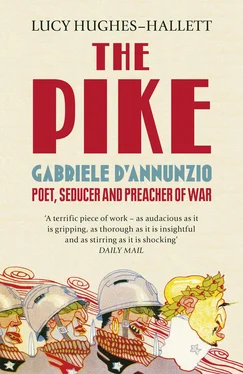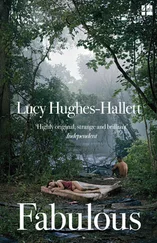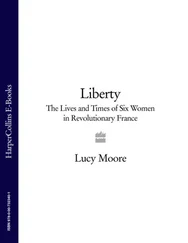He returned to school. Back in Prato he confessed his love to Tito, who gave him permission to write to Giselda. Within days she had told him she loved him in return. In the school dormitory d’Annunzio stayed awake until dawn, kissing her photograph and writing her long letters. Sometime he expressed himself as any teenager might: ‘I am happy, happy, happy.’ Or, ‘I love you, I love you, I love you.’ Sometimes his letters show how unusual he was. ‘Kiss me Elda, kiss me. Thrust your little hands into my hair and hold me nailed down and quivering like a leopard enchained.’
D’Annunzio’s erotic career began early. As the smartly uniformed boys of the Cicognini marched around Prato he was much inclined, so one of his teachers noted, to turn and stare at passing young women. Spending his school holidays with family friends in Florence, he escorted the daughter of the house (aged seventeen to his fourteen) to the Museum of Archaeology and kissed her in the Etruscan Room, falling on her mouth (as he recalled years later) as ravenously as a famished labourer might fall on food at the end of a day’s hard work and thinking – with a kind of delirious horror – about the other secret ‘mouth’ beneath her skirts. On a school trip he slipped away from his teacher, and sold his grandfather’s gold watch to pay for his initiation by a prostitute. That summer, sixteen years old and allowed home at last, he flirted with several young ladies in Pescara’s polite small-town society, and – according to his own later account – raped a peasant girl who struggled and babbled and shook with terror as he hunted her down in a vineyard and knocked her to the ground.
By the time he met Giselda two years later his craving for sex had become entangled with an appetite for suffering and with fantasies of death. It was the sight of Giselda’s tears that had first fired him with love. ‘I want to make those tears fall again,’ he wrote to her. He imagined she would be sobbing, frantic for a word from him. He luxuriated in the idea of her unhappiness. He even told her how much he would like to see her corpse. He loved it that she was deathly pale, like ‘the Blessed Damozel’, the dead girl of Rossetti’s famous poem and painting, but he would have preferred her even paler. He told her that he would go around all the florists in the city, fill a carriage with assorted flowers, and come to bury her beneath them. ‘Yes! To bury you! I want to make you die!’
He wrote to Tito Zucconi, not, as one might expect, promising to cherish and protect Tito’s daughter, but announcing: ‘I and Elda cannot live long.’ Both he and Giselda were, so far as we know, in perfectly good health, yet d’Annunzio wrote: ‘Our cold bodies will fall to the earth to feed the flowers; and we will be swept away, unconscious atoms, in the irresistible currents of the universal force.’ D’Annunzio had not yet heard Wagner’s Tristan and Isolde (on which his novel The Triumph of Death would be a variation) but the fantasy of Liebestod already possessed him. ‘If you were here now,’ he wrote to Giselda, ‘we would kill each other … Don’t you feel all the tragic terror of this passion?’
Letters began to pass between the young couple almost daily. She sent him her photograph and pressed flowers (her father acting as emissary). He sent her words, thousands upon thousands of them (around 500 letters in under two years). This was a love affair all made of words on paper. D’Annunzio wrote proudly to Chiarini, only six days after he had met Giselda, that he had found his ‘Beatrice’. So d’Annunzio was the new Dante and poor Giselda had been assigned the role of the girl whom Dante (if his poeticised account of their meetings is to be taken literally) laid eyes on only twice, who inspired his poetry and personified his ideal, but in whose actual life he played no part at all.
D’Annunzio set about remaking Giselda as an accessory suited to his own self-image. He deplored the conventional pose (‘so, so common’) of the photograph she had given him. He wanted her to look like a ‘proud and pensive queen, on the arm of her poet’. He renamed her (he would give all his lovers new names). ‘I want to call you Elda,’ he wrote. The name was more caressing than the full-length Giselda, more fitting for the child he wanted her to be. ‘You’re not a great big woman,’ he wrote. (He was to address many of his lovers, even when they towered over him, as ‘Little One’). He called her ‘bimba’ (baby), and imagined nursery scenarios, in which she played a petulant child. ‘It’ll do you no good to stamp your little feet on the ground … Come Elda … Baby, little pretty pretty pretty one. Forgive me? … You’re laughing, aren’t you?’ But if he liked to infantilise and dominate her, he also liked to be dominated. He told her that she was ‘bad’, ‘wicked’. He instructed her to wear black. ‘I detest, detest, detest pale colours on a woman.’ It would set off the pallor of her skin and it was appropriate to the other role he had assigned her, that of a ‘witch’, like Keats’s ‘La Belle Dame sans Merci’ or Tennyson’s Morgan le Fay.
Term ended, the young lovers could at last meet for the first time since they had declared themselves. ‘What happy hours we had yesterday!’ d’Annunzio wrote to Giselda the next day. ‘Do you know that for twelve hours we were always in each other arms, always kissing with those long long kisses which made us tremble in every limb, always whispering those soft words?’ Of course she knew, but for d’Annunzio an experience was insubstantial until he had written it down. During the eleven days he stayed in Florence he wrote several of the lyrics which would appear the following year in his next collection, Canto Novo, with its dedication to Elda, ‘the great the beautiful the most adored inspiration’. By the time he left for Pescara he considered himself engaged to her. Tito, who knew that his daughter had caught the eye of an exceptionally talented boy, made no objection. D’Annunzio confidently told both father and daughter that his own parents doted on him. They would agree to anything that would make him happy. And so off he went to Pescara.
In his first novel, Pleasure, d’Annunzio describes his hero, Andrea Sperelli, anguished by his bewitching mistress’s sudden and inexplicable announcement that she is leaving him. She stops her carriage. He descends. He is in despair. ‘What did he do, once Elena’s carriage had disappeared in the direction of the Four Fountains? – Nothing, to be honest, out of the ordinary.’ Sperelli goes home, changes into evening dress and goes to a dinner party, not apparently to give Elena much thought until they meet again by chance two years later. Sperelli is by no means a faithful self-portrait of his creator (he is very much richer and more aristocratic), but author and fictional character have a great deal in common, and this trait is one they share. There is no reason to suppose that d’Annunzio was cynical in his treatment of Elda. He was, for a while, in love with her. He probably really thought of marrying her. And yet, once he had left Florence, he doesn’t seem to have missed her very much.
Life was sweet for d’Annunzio that summer. Eighteen years old, finished with school at last, he was poised to enter the adult world where his reputation, going before him, would guarantee him a welcome. Returning to places he loved and a growing circle of entertaining friends, he enjoyed a long, delicious and productive summer by the sea. His family were gratifyingly proud of him. Francesco Paolo had had the titles of the poems in Primo Vere written into the frescoes on the drawing-room walls. He was working fast, writing the stories of peasant life that would be published the following year in Terra Virgine, and more poems for Canto Novo. He was also enjoying himself. He rode, he swam, he went boating by moonlight.
Читать дальше












